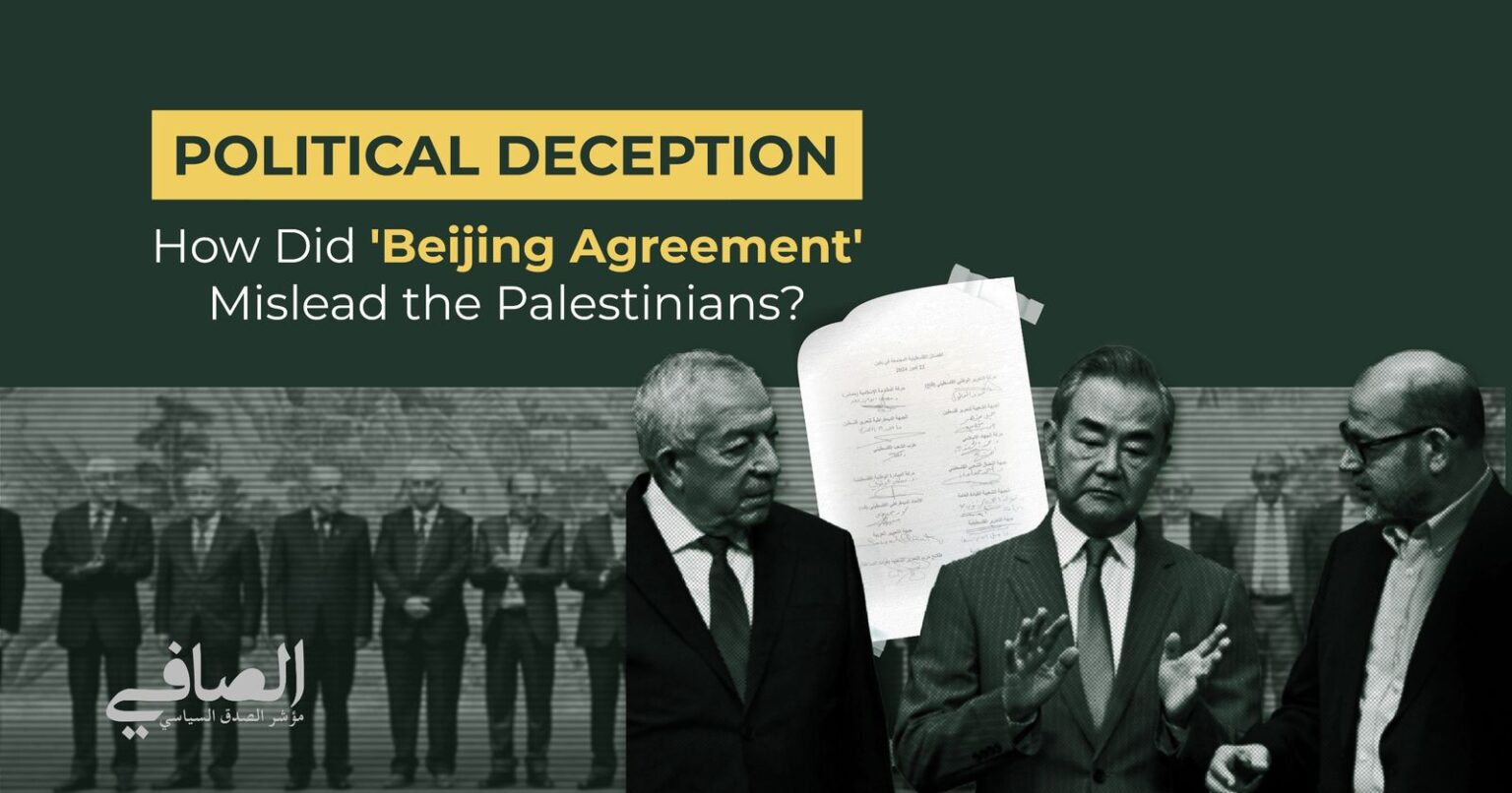On 22 July 2024, Fatah, Hamas, and 12 other political factions announced in the Chinese capital, Beijing, the signing of an agreement aimed at achieving national unity and reconciliation under the umbrella of the Palestine Liberation Organization (PLO). According to Chinese Foreign Minister Wang Yi, the most significant point of the agreement was the formation of a temporary national reconciliation government to address the post-war situation.
Now, months after the signing of this agreement, we revisit the terms that were agreed upon by the two rival factions in the presence of the Palestinian groups, along with the subsequent statements released by various factions, in order to assess the credibility of the commitments and the extent to which they have been implemented.
The Claims:
It was declared that implementation of the agreement would begin immediately upon the return of the faction representatives from Beijing, with a timeline to be set for carrying out the declaration. The key agreed-upon points included:
- Formation of a temporary national unity government, with consensus among Palestinian factions and a formal decree by President Mahmoud Abbas, in accordance with the current Palestinian Basic Law. This government would exercise full authority over all Palestinian territories, affirming the unity of the West Bank, Jerusalem, and Gaza. Its tasks would include unifying Palestinian institutions across the Palestinian state, initiating the reconstruction of the Gaza Strip, and preparing for general elections under the supervision of the Central Elections Commission, to be held as soon as possible and in accordance with the established electoral law.
- Agreement to activate and regularize the unified interim leadership framework for shared political decision-making, as outlined in the Palestinian National Reconciliation Document signed in May 2011.
- Agreement on a collective mechanism to implement all aspects of the declaration, with the meeting of factional secretaries-general serving as a launch point for the urgent work of national task forces. A timeline was also to be established for the implementation of this declaration.
- Preparation for general elections, to be held as soon as possible under the supervision of the Palestinian Central Elections Commission and in accordance with the applicable electoral law.
The Beijing Declaration was presented as a departure from previous agreements, with several factions issuing statements and press releases asserting that it would, in fact, lead to genuine reconciliation.
Verification Details:
Kashif’s investigation into the implementation of the Beijing reconciliation agreement relied on a combination of open-source information, direct communication with political party leaders who were present at the signing, and insights from political analysts closely following the Palestinian reconciliation file and its developments. Kashif’s findings are as follows:
Claim 1:
A timeline was set for the implementation of the agreement, beginning with the formation of a temporary national reconciliation government to address the post-war situation in Gaza.
Although this claim was stated verbatim in the Beijing Agreement, no steps have been taken to form a national reconciliation government, despite eight months having passed since the announcement.
Efforts were made to reach Mahmoud Al-Aloul, Deputy Chairman of Fatah and the movement’s representative at the agreement, as well as Azzam Al-Ahmad, senior Fatah official and longtime handler of the reconciliation file. However, interviews could not be arranged with either of them at the time this report was written.
In response, Abd Dawla, spokesperson for Fatah’s Mobilization and Organization Commission, stated that the party’s reluctance to discuss the matter stemmed from a desire to preserve the groundwork for national consensus, given the difficult circumstances the Palestinian people are enduring. He acknowledged that while some detailed issues remained unresolved and were deferred to a future stage, the current priority is national unity and rallying the people around their national cause.
Regarding the Beijing meeting, Dawla confirmed that the faction representatives did not delve into details, instead focusing on general principles and mobilizing joint efforts to end the war on Gaza.
He said, “The priority was ending the war first, then moving toward managing Palestinian affairs through a unified Palestinian authority and a single government responsible for both the West Bank and Gaza—politically and geographically. The imminent threat posed by Israel today is the separation of the West Bank from Gaza.”
Dawla did not directly address the accuracy of any of the specific claims examined in this verification and concluded with this clarification.
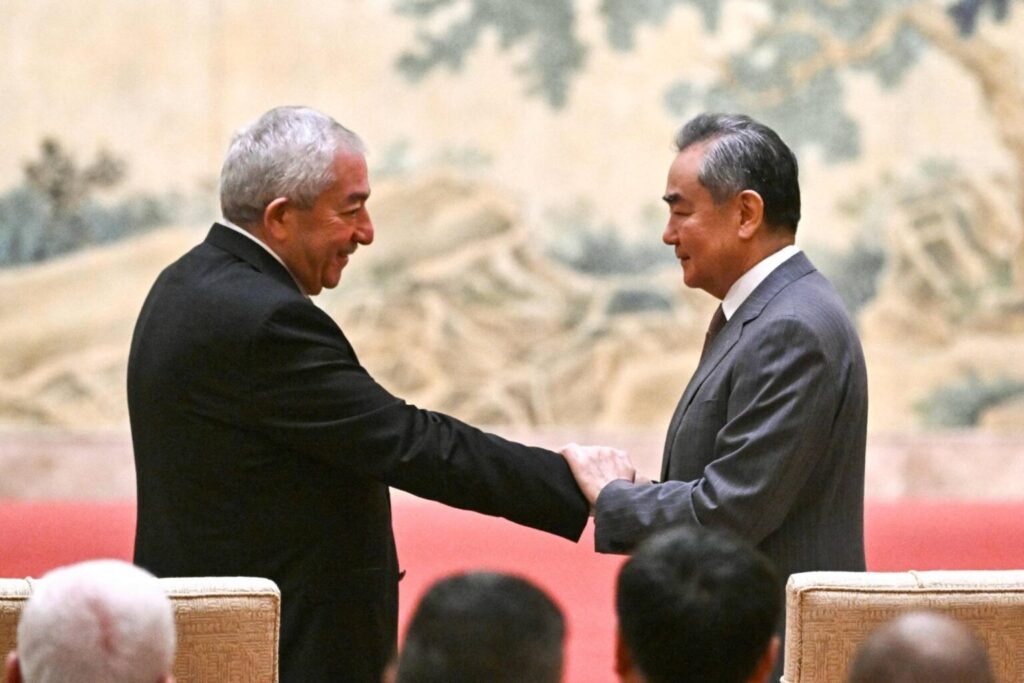
Contrary to Dawla’s Statement:
Wasel Abu Yousef, coordinator of the National and Islamic Forces, affirmed that the implementation of the Beijing Agreement was never contingent on the end of the war. He emphasized that the agreement clearly stated that the President was expected to call for a unified factional meeting immediately upon returning from China, as had been agreed.
Abu Yousef stressed that the core of the agreement revolves around national constants, such as the integration of Hamas and Islamic Jihad into the Palestine Liberation Organization (PLO), in addition to reaffirming the right of return, national legitimacy, and internal Palestinian arrangements.
He stated, “The matters agreed upon were never, in any way, tied to the end of the war on Gaza. This confirms that the implementation of the agreement was not dependent on the war’s conclusion.”
Regarding the government, Abu Yousef clarified that there was no final agreement on whether it would be a new government or a continuation of the current one. However, there was consensus that it would be a national unity government responsible for managing the affairs of both the West Bank and Gaza.
Attempts were made to reach out to several political and leadership figures in Hamas to obtain their comments on the matter. However, no responses were received from them as of the time this report was written.
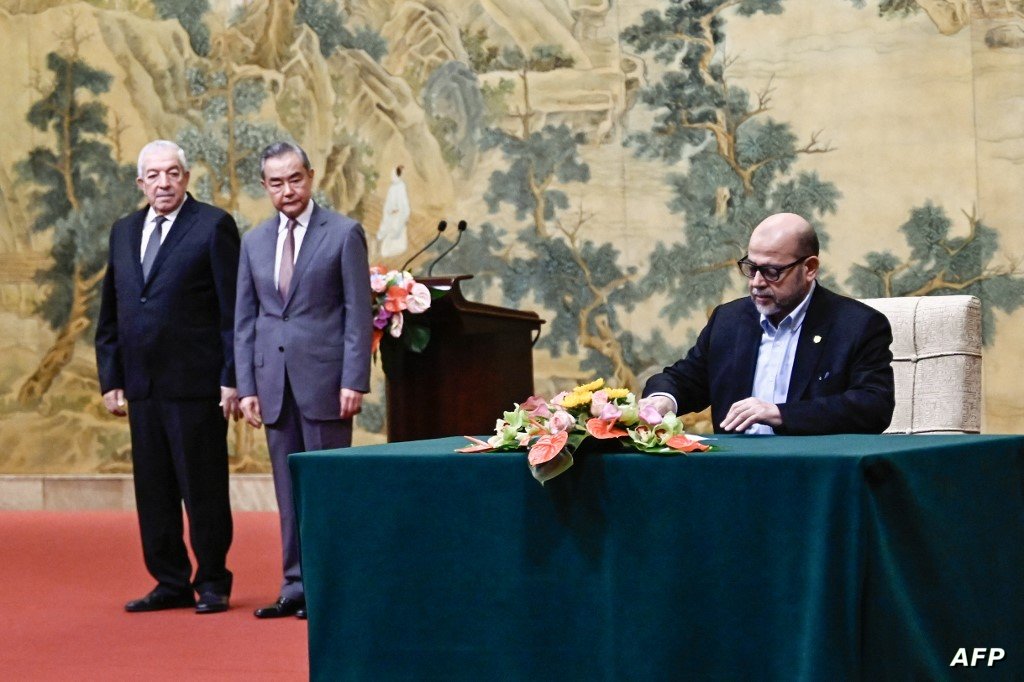
Further Verifications and Findings
Bassem Al-Salhi, Secretary-General of the Palestinian People’s Party, also confirmed that the implementation of the Beijing Agreement was not conditional on the end of the war, and that delaying its execution was never officially proposed by Fatah during formal negotiations. However, he noted that during informal side discussions, the Fatah delegation did suggest postponing the formation of a national unity government until after the war—but this was never formally tabled or agreed upon. In essence, the content of the agreement was never tied to a ceasefire.
Claim 2:
Activation and regular convening of the unified interim leadership framework for joint political decision-making, and holding a secretaries-general meeting upon return from Beijing.
On this point, Al-Salhi emphasized that factional secretaries-general had been waiting to be called immediately after returning from Beijing to a meeting that would discuss the outcomes of the talks in China, along with other critical issues facing the Palestinian cause. However, this meeting never took place.
We also spoke to Majda Al-Masri, the representative of the Democratic Front for the Liberation of Palestine (DFLP) at the Beijing meeting and Deputy Secretary-General of the DFLP. She confirmed that one of the key items agreed upon in Beijing was to promptly convene the unified interim leadership framework, chaired by President Mahmoud Abbas, immediately after returning from Beijing. This, alongside the formation of a national unity government composed of independent, national, and academic figures, was supposed to move forward regardless of the war in Gaza.
“Unfortunately, despite nearly eight months having passed since the Beijing Agreement, the unified leadership framework has not been convened by the president, nor has a national unity government been formed as agreed,’ she said.
Claim 3:
Laying the groundwork for general elections under the supervision of the Palestinian Central Elections Commission (CEC) as soon as possible, in accordance with the established election law.
Despite the passage of eight months since the signing of the Beijing Agreement, no official statement has been issued by the Palestinian presidency or the CEC indicating that the president has directed the Commission to begin preparations for general elections. Since the CEC is the legally authorized body to announce and manage election processes, this clearly indicates that this clause has also not been implemented.
Dr. Mustafa Barghouti, Secretary-General of the Palestinian National Initiative and a participant in the Beijing meeting and in drafting the agreement’s text, explained that three main steps were supposed to take place immediately upon return from China:
- The President would begin consultations to form a national unity government, and lay the groundwork for general elections.
- The President would call for a meeting of the unified interim leadership framework, as stipulated in the Cairo Agreement of 2011.
- A meeting of the secretaries-general would be convened to discuss the details of implementing the agreement.
Barghouti concluded that none of these steps have been implemented to date.
Claim 4:
The Beijing Agreement was different from previous ones, and reflected genuine political will from all parties to end the division.
While many political factions had described the Beijing Agreement as a turning point with serious intent from the parties involved to end the internal division, the failure to implement any of its key clauses raises serious questions about the sincerity and effectiveness of that political will. The lack of follow-through on agreed actions—despite broad political consensus and urgent national needs—suggests that the agreement may not be as different as initially claimed.
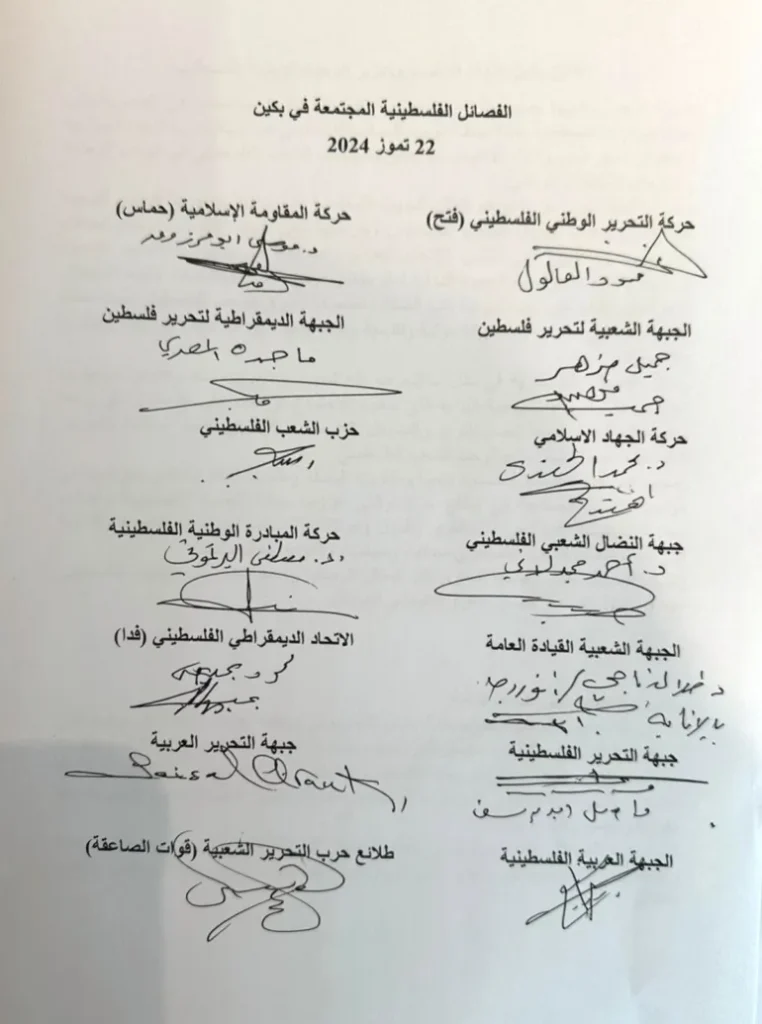
Presidency’s Silence and the Illusion of a “Different” Agreement
Despite all Palestinian factions that met in Beijing signing the Beijing Declaration, the Palestinian Presidency has not issued any official statement clarifying its position on the agreement—which came as part of an initiative by a major global power, China.
Instead, the only statement released by the Presidency—one day after the signing of the agreement—expressed appreciation for China’s remarks, conveyed by its Foreign Minister, regarding the need to halt the aggression on Gaza and to facilitate humanitarian aid. The Presidency described these statements as being fully aligned with its stance and aspirations.
However, the statement made no mention whatsoever of the Beijing Agreement itself, nor did it comment on China’s initiative to broker national reconciliation. There was no indication of intent or commitment to the agreement from the Presidential Office—either in that statement or in any subsequent communication.
The eight-month delay since the Beijing Agreement—with no action taken toward implementation—strongly suggests that the claim that this agreement was different from previous ones is, in fact, misleading.
Was the “Support Committee” Proposal a Substitute for the Beijing Agreement?
A few weeks after the Beijing Agreement, Fatah and Hamas held a meeting in Egypt, where they tentatively agreed on an Egyptian proposal to establish a “Community Support Committee” tasked with managing Gaza’s affairs in the immediate aftermath of the war.
Rateeba Al-Natsheh, member of the political bureau of the Palestinian Democratic Union (FIDA), stated that many Palestinian factions opposed the Support Committee agreed upon by Fatah and Hamas in principle. They considered it a breach of the Beijing Agreement, arguing that the mere formation of such a committee reveals a lack of genuine intent by both parties to implement the agreement.
Historical Context
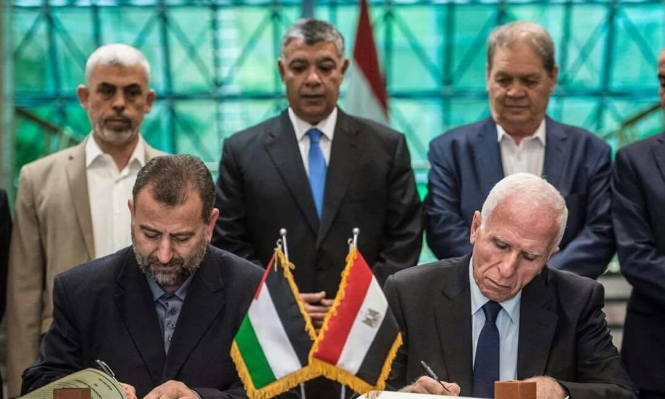
The first reconciliation meeting between Fatah and Hamas was held in Cairo in 2005, even before the Palestinian legislative elections that brought Hamas to power. Following the armed clashes between the two movements, the Mecca Agreement was signed in Saudi Arabia as an attempt to contain the internal conflict.
Both the Cairo and Mecca Agreements, along with successive reconciliation efforts over the years, consistently included a number of key provisions—starting with a commitment to the sanctity of Palestinian blood, the formation of a national unity government, progressing toward reform and development of the PLO, holding regular elections, and unifying and restructuring the security services.
These same provisions were later agreed upon in the Sanaa Agreement in 2008, and again that year in Egypt under the sponsorship of the late Egyptian President Hosni Mubarak, following Israel’s offensive on Gaza. Another round of talks took place in Egypt in 2011.
In 2012, reconciliation efforts moved to Doha, under the sponsorship of Qatar’s Emir at the time, Sheikh Hamad bin Khalifa Al Thani, and in 2014, a key meeting was held at the home of Ismail Haniyeh in Gaza—known as the Al-Shati (Beach) Agreement.
After a five-year hiatus, the factions met again in Cairo in 2017, reiterating the commitments made in previous agreements. In 2019, Palestinian factions reconvened in Moscow, issuing a joint statement reaffirming the unity of the Palestinian people around core national issues—particularly ending the occupation and establishing an independent Palestinian state. The statement emphasized the importance of ending the internal division and implementing previously signed agreements. It was signed by Fatah, Hamas, and both the Popular Front and Democratic Front for the Liberation of Palestine, along with other factions in attendance.
In 2020, Fatah and Hamas held a bilateral meeting in Istanbul, Turkey, with its most notable outcome being an agreement to officially declare national consensus at a secretaries-general meeting.
Two years later, in Algeria, Palestinian factions signed a new reconciliation document under the patronage of Algerian President Abdelmadjid Tebboune. The document called for practical steps to end division, achieve national reconciliation, elect a new Palestinian National Council under agreed frameworks and laws, and expedite presidential and legislative elections across Palestinian territories.
Despite the failure of all previous efforts to implement the agreed-upon provisions, the announcement of a meeting in Beijing, months after the outbreak of war in Gaza, revived hope among Palestinians—especially in Gaza, where the meeting took place while they were under relentless bombardment. For many, it represented a glimmer of hope for ending the war and alleviating their suffering.
Statement Classification
| The entire Beijing agreement can be classified as a “misleading” announcement. | |
| There was a real political will to end the division between Fatah and Hamas when they signed the Beijing Agreement. | misleading |
| The factions agreed to convene a temporary unified leadership framework after returning from Beijing, to prepare for national elections, and to form a national unity government. | Misleading “not complied with” |
Verification Outcome
Despite the eight months that have passed since the signing of the Beijing Agreement, none of its provisions have been implemented to date.
There was no genuine political will from Fatah and Hamas to end the division when the factions signed the Beijing Agreement.
While the factions did agree on calling for the temporary unified leadership framework after returning from Beijing, as well as preparing for national elections and forming a national unity government, none of these actions have been carried out up to the time of writing this report.


